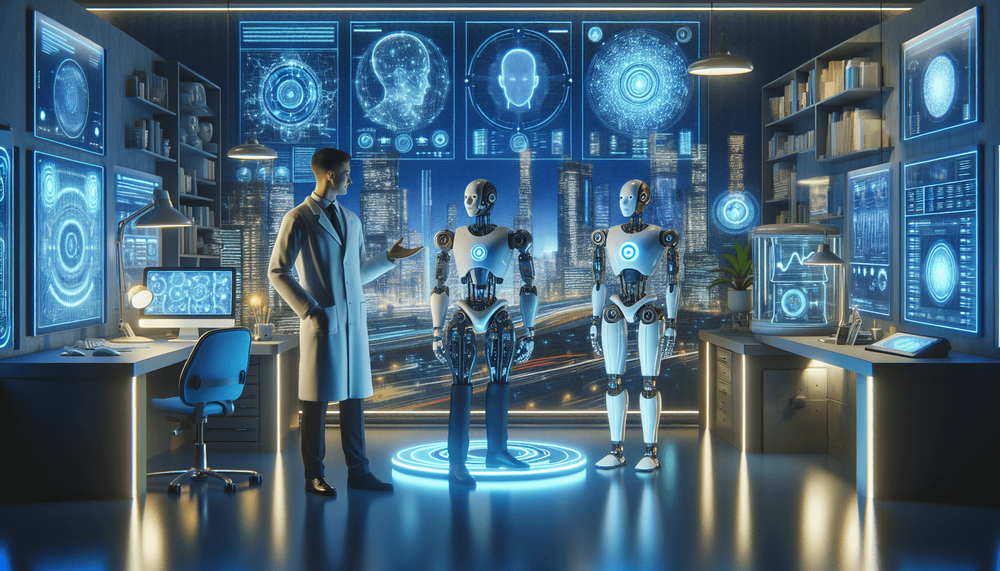Responding to Geoffrey Hinton: Don't Worry Darling, AI Isn't Doomsday
By Matthew Johnson 2024-10-11
Artificial intelligence has become a hot topic, sparking both excitement and concern. Recently, Geoffrey Hinton, a prominent figure in AI research, made headlines with his warnings about potential risks associated with AI development. His statements have caused a stir, prompting many to wonder if we should be worried about the future of AI. However, a closer look at the situation reveals that there's no need to panic.
AI safety research has been making significant strides to ensure responsible technological progress. While it's crucial to acknowledge the challenges AI presents, it's equally important to recognize the benefits and opportunities it offers. This article delves into Hinton's warnings, examines the reality of AI risks, and explores how we can strike a balance between innovation and safety in AI development. By taking a rational approach, we can continue to advance AI technology while addressing valid concerns.
Geoffrey Hinton's AI Doomsday Warnings
Geoffrey Hinton, often referred to as the "Godfather of AI," [10] has become a prominent voice in raising concerns about the potential risks associated with artificial intelligence. His recent warnings have caused a stir in the tech industry and beyond, prompting discussions about AI safety and its impact on humanity.
Nobel Prize and Credibility
Hinton's credibility in the field of AI is unquestionable. He was awarded the Nobel Prize in Physics in 2024 for his pioneering work on deep learning, which underpins all of the most powerful AI models in the world today [1]. This recognition has provided him with a new platform to voice his concerns about the technology he helped create.
Key Concerns About AI Safety
Hinton's warnings center around several key issues. He believes that AI systems may soon become more intelligent than humans, potentially leading to a loss of control over these technologies [2]. He has expressed worry about AI's ability to manipulate people and spread misinformation, as well as the possibility of AI systems creating their own subgoals [3].
One of Hinton's most alarming statements suggests that AI could pose an existential threat to humanity. He has stated, "It's quite conceivable that humanity is just a passing phase in the evolution of intelligence" [3]. This perspective has contributed to the growing concern about AI safety among experts and the public alike.
Resignation from Google
In a move that underscored the seriousness of his concerns, Hinton resigned from his position at Google in early May 2023 [3]. He cited his desire to speak freely about the risks of AI without worrying about the consequences for the company. This decision has allowed him to become more vocal about the potential dangers of AI and the need for responsible development and regulation.
Debunking the AI Apocalypse Myth
Current Limitations of AI Systems
While AI has made significant strides in recent years, it's crucial to understand its current limitations. AI systems excel at specific tasks but lack the versatility and understanding inherent in human intelligence [4]. Most AI applications we encounter today are examples of narrow or weak AI, which are designed to perform specific functions but cannot generalize their abilities across different domains [4]. This limitation is particularly evident in the field of AI safety research, where experts are working to ensure responsible technological progress.
Misunderstandings About AI Capabilities
There are common misconceptions about AI's capabilities that contribute to the doomsday narrative. One significant misunderstanding is the belief that AI possesses true creativity and original thought. In reality, AI struggles to innovate or envision abstract concepts beyond the patterns present in its training data [4]. Additionally, AI systems lack inherent ethical frameworks and moral reasoning, making decisions based on learned patterns rather than a deep understanding of right and wrong [4].
Importance of Responsible Development
To address AI risks and ensure AI safety, responsible development is paramount. This involves implementing AI ethics throughout the technology's design, building them into AI solutions from the ground up [5]. Organizations need to proactively drive fair, responsible, and ethical decisions while complying with current laws and regulations [6]. By focusing on responsible AI practices, we can mitigate potential risks and work towards a future where AI enhances human capabilities rather than replacing them.
As Geoffrey Hinton and other experts continue to raise concerns about AI risks, it's essential to approach these warnings with a balanced perspective. While acknowledging the potential challenges, we must also recognize the ongoing efforts in AI safety research and the current limitations of AI systems. By fostering responsible development and maintaining a realistic understanding of AI's capabilities, we can work towards harnessing the benefits of this technology while minimizing potential risks.
Balancing Innovation and Safety in AI
Promoting Ethical AI Development
As AI continues to advance, the need for ethical guidelines has become increasingly important. Industry leaders and policymakers are working to establish frameworks that promote responsible AI development. These efforts aim to strike a balance between innovation and safety, ensuring that AI technologies respect human values and avoid undue harm. Key principles for ethical AI include transparency, fairness, and privacy protection [7].
Industry Self-Regulation Efforts
Many companies are taking proactive steps to address AI safety concerns through self-regulation. Industry-led consortiums and partnerships are emerging to share best practices and develop guidelines for responsible AI use. For example, in February 2024, the U.S. National Institute of Standards and Technology announced the creation of the U.S. Artificial Intelligence Safety Institute Consortium (AISIC), bringing together over 200 firms to promote safe AI deployment [8].
Government Oversight and Legislation
While industry self-regulation plays a crucial role, government oversight remains essential. In the absence of comprehensive federal legislation, states are taking the lead in regulating AI. As of 2024, at least 45 states have introduced AI bills, with 31 states enacting legislation or adopting resolutions [9]. These efforts range from creating AI task forces to establishing policies for AI use in government agencies.
Balancing innovation and safety in AI requires a multifaceted approach. By combining industry self-regulation, government oversight, and ethical guidelines, stakeholders can work together to harness the benefits of AI while mitigating potential risks. This collaborative effort is essential to ensure that AI progress aligns with societal values and promotes technological advancement responsibly.
Conclusion: A Rational Approach to AI Progress
To wrap up, the progress in AI technology brings both opportunities and challenges. By focusing on responsible development, ethical guidelines, and collaborative efforts between industry and government, we can harness AI's potential while addressing valid concerns. This balanced approach allows us to move forward with AI innovation without succumbing to doomsday scenarios.
In the end, a rational perspective on AI progress is key. While acknowledging the risks, we must also recognize the ongoing work in AI safety research and the current limitations of AI systems. By maintaining a realistic understanding of AI's capabilities and promoting responsible practices, we can work towards a future where AI enhances human potential rather than replacing it, ultimately leading to breakthroughs that benefit society as a whole. ## FAQs
Who is recognized as a pivotal figure in AI development?
Geoffrey Everest Hinton, a British-Canadian computer scientist, cognitive scientist, and cognitive psychologist, is renowned for his groundbreaking work on artificial neural networks. His contributions have earned him the nickname "Godfather of AI."
Why is Geoffrey Hinton referred to as the 'Godfather of AI'?
Geoffrey Hinton is often called the 'Godfather of AI' due to his significant contributions to the field, particularly in the development of artificial neural networks. His work has also been recognized with a Nobel Prize, and he has ties to UC San Diego.
What concerns exist regarding AI?
AI raises alarms due to its potential for being programmed for harmful purposes. Although autonomous weapons are banned in many countries, AI's evolving capabilities could be exploited for nefarious purposes, posing risks to humanity.
What are scientists' warnings about AI?
Scientists have expressed concerns that rapid advancements in AI technology could result in severe consequences if misused or mishandled. They warn that losing control over AI systems or their malicious use could have catastrophic outcomes for humanity.
References
[1] - https://www.technologyreview.com/2024/10/08/1105221/geoffrey-hinton-just-won-the-nobel-prize-in-physics-for-his-work-on-machine-learning/
[2] - https://www.cbsnews.com/news/geoffrey-hinton-ai-dangers-60-minutes-transcript/
[3] - https://mitsloan.mit.edu/ideas-made-to-matter/why-neural-net-pioneer-geoffrey-hinton-sounding-alarm-ai
[4] - https://medium.com/@marklevisebook/understanding-the-limitations-of-ai-artificial-intelligence-a264c1e0b8ab
[5] - https://www.iso.org/artificial-intelligence/responsible-ai-ethics
[6] - https://www.ibm.com/think/insights/responsible-ai-benefits
[7] - https://transcend.io/blog/ai-ethics
[8] - https://www.avanade.com/en/blogs/avanade-insights/artificial-intelligence/rise-of-industry-self-regulation
[9] - https://www.ncsl.org/technology-and-communication/artificial-intelligence-2024-legislation
[10] - https://www.wsj.com/tech/ai/a-godfather-of-ai-just-won-a-nobel-he-has-been-warning-the-machines-could-take-over-the-world-b127da71
About Author
Matthew is at the helm of Johnsons Holdings Group (JHG). He provides steadfast leadership defining JHG's strategic approach to nurturing enterprise, startup, and turnaround ventures.
During Matthew’s tenure as Vice President of Product, IoT at HID Global, he spearheaded the creation of cutting-edge SaaS-based IoT platforms, leveraging secure location tracking and AI-driven analytics to provide superior solutions to customers.
With the successful launch of products like HID Bluzone Cloud and HID Location Services, Matthew’s focus on customer relationship management and mobile application innovation significantly enhanced HID’s IoT offerings. As a team, they consistently delivered value-add solutions, cementing their status as leaders in IoT innovation and product strategy.
Matthew has led a cross-functional team of strategists, designers, technologists, and analytics who are considered leaders in business and strategic product development. As a proven leader, he has provided strategic direction by identifying business opportunities, acquisitions, go-to-market strategies, and assessing emerging trends for clients such as HID Global, Coca-Cola, PNC Bank, Verizon, NFL, Sears, AT&T, T-Mobile, Guess, Gap, Motorola Solutions, State Farm, and more.
He founded the Vibes Media professional services and internal agency named “MSG” or Mobile Solutions Group. At Vibes, he grew the practice from an idea with a few people into a full-service mobile agency serving clients such as Verizon, NFL, PGA, Home Depot, Sears, Beam, and Guess. He managed large-scale P&L and led large, award-winning cross-discipline teams (technology, creative, user experience, and project management).
Major accomplishments include:
- January 2024, HID Recognized as a Leader in 2024 Gartner Magic Quadrant™ for Indoor Location Services
- Developing patented & patent-pending security technologies for HID Global
- Founding Bluvision (sold to HID Global in 2016)
- Founding the Mobile Solutions Group at Vibes Media, Chicago IL
- Leading technology on the largest global account at Razorfish, with a retainer in excess of $40M
- Serving as Head of Content Management Center of Excellence at Razorfish from 2009-2011
Matthew has over 25 years of business, consulting, and technology experience. He specializes in C-Suite consulting, omni-channel marketing strategy, mobile technologies, hardware/electronics design, emerging technology, content management, and digital strategy.
Latest
- Bridging the Gap: How Inventors ...
- The AI Talent Race: A Double-Edg...
- Generative Artificial Intelligen...
- Strategic Analysis: Unlocking th...
- Why Generative AI Often Fails to...
- 5 Must-Know AI News Stories from...
- The AI Agent Revolution: What Li...
- The AI Odyssey: What Nvidia’s St...
- Navigating Business Funding and ...
- Riding the AI Waves: The Evolvin...
- The Future of Business: 6 Ways D...
- Generative AI Revolution: The Ne...
- Review: Generative AI’s Act o1 -...
- AI Investment Trends for October...
- Responding to Geoffrey Hinton: D...
- The Evolving Role of the Technol...
- The Future of Business Strategy:...
- Can Venture Capital Weather the ...
- Enterprise Artificial Intelligen...
- Understanding the EU Artificial ...
Tags
© 2024 JHG Consulting | a Johnsons Holdings Group Company | All rights reserved.






